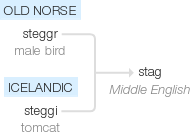Stag
Middle English (as a noun): related to Old Norse steggr ‘male bird’, Icelandic steggi ‘tomcat’.
wiktionary
From Middle English stagge, steg, from Old English stagga, stacga(“a stag”) and Old Norse steggi, steggr(“a male animal”), both from Proto-Germanic *staggijô, *staggijaz(“male, male deer, porcupine”), probably from Proto-Indo-European *stegʰ-, *stengʰ-(“to sting; rod, blade; sharp, stiff”). Cognate with Icelandic steggi, steggur(“tomcat, male fox”). Related to staggard, staggon.
etymonline
stag (n.)
late 12c., probably from Old English stagga "a stag," from Proto-Germanic *stag-, from PIE root *stegh- "to stick, prick, sting." The Old Norse equivalent was used of male foxes, tomcats, and dragons; and the Germanic root word perhaps originally meant "male animal in its prime."
Adjectival meaning "pertaining to or composed of males only" (as in stag party) is American English slang from 1848. Compare bull-dance, slang for one performed by men only (1845); gander (n.) also was used in the same sense. Stag film "pornographic movie" is attested from 1968. Stag beetle, so called for its" horns," is from 1680s.
